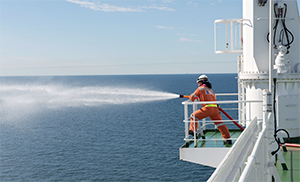The U.S. Coast Guard recorded a 41 percent increase in the number of foreign-flagged vessels detained in 2015, the highest annual increase in 17 years, according to a recent report from Port State Control.
The most common deficiencies involved firefighting systems, with the category accounting for 21 percent of detentions.
Several detentions were the result of intentional manipulation of fire protection systems and oily water separators, according to Capt. Kyle McAvoy, chief of the Office of Commercial Vessel Compliance.
Many deficiencies resulted when vessel operators blocked quick-closing fuel shutoff valves in the open position, making remote closure from outside of the space in the event of a fire impossible, or when oily water separators were bypassed to discharge waste.
“We’re unable to speculate on why these things are occurring, but want to emphasize the importance of ensuring systems are not manipulated in a manner that is unsafe and environmentally unsound,” said Coast Guard spokeswoman Lt. Katie Braynard.
The number of ships detained for environmental protection and safety-related deficiencies increased from 143 in 2014 to 202 in 2015. Ships detained for security-related deficiencies increased from 10 to 11. Bulk carriers continued to lead the count with 40 percent of all detentions, but vessel age didn’t appear to be a factor: Seventy percent of bulkers detained were 12 years old or newer.
 |
|
A Coast Guard technician climbs up the side of a tanker to conduct an inspection while the ship was anchored in Galveston, Texas, in September 2015. Tanker detentions increased last year after dropping in 2014. |
|
Photo courtesy U.S. Coast Guard |
Tanker detentions increased after dropping in 2014, with six, five and 16 detentions reported, respectively, over the past three years. The Coast Guard attributed this increase, in part, to an improvement in training programs.
Sectors New Orleans and Miami saw the most detentions, with 53 and 31, respectively.
“New Orleans sees a disproportionate number of older bulk carriers and Miami sees a disproportionate number of small cargo ships in the Caribbean trade,” Braynard said. “Due to the age and service of these vessels, keeping up with repairs and maintenance can be challenging.”
The Coast Guard uses risk-based targeting to screen all foreign vessels before they arrive. The targeting process dictates how often they are examined. While all foreign passenger ships and tankers are subject to annual inspection, they may be examined more frequently based on this targeting.
Detentions can be costly or even detrimental. “The risk of detention and the cost of delays and the stigma attached to detentions by the industry provide sufficient deterrence,” Braynard said. “Vessels that have chronically poor detention history in the United States may be banned from visiting the United States for a specified time.”
On the flip side, those with exemplary compliance can save time and reap benefits. Through the Coast Guard’s incentive program QualShip 21, which was launched in 2001, foreign vessels — excluding passenger ships and tankers — can have Port State Control examinations deferred for up to three years.
The recent trend in detentions, however, has resulted in the revocation of QualShip 21 eligibility for 13 nations. Three countries that were not previously qualified — Italy, Mexico and the Philippines — have joined the program.

